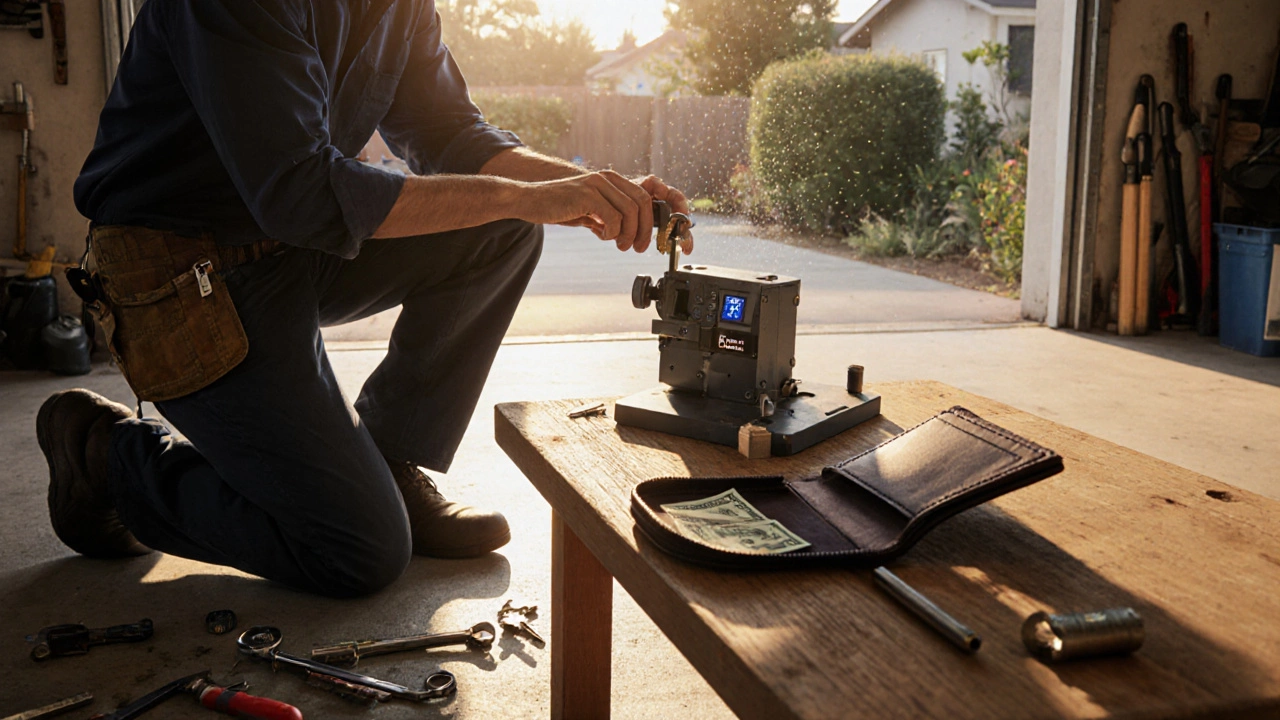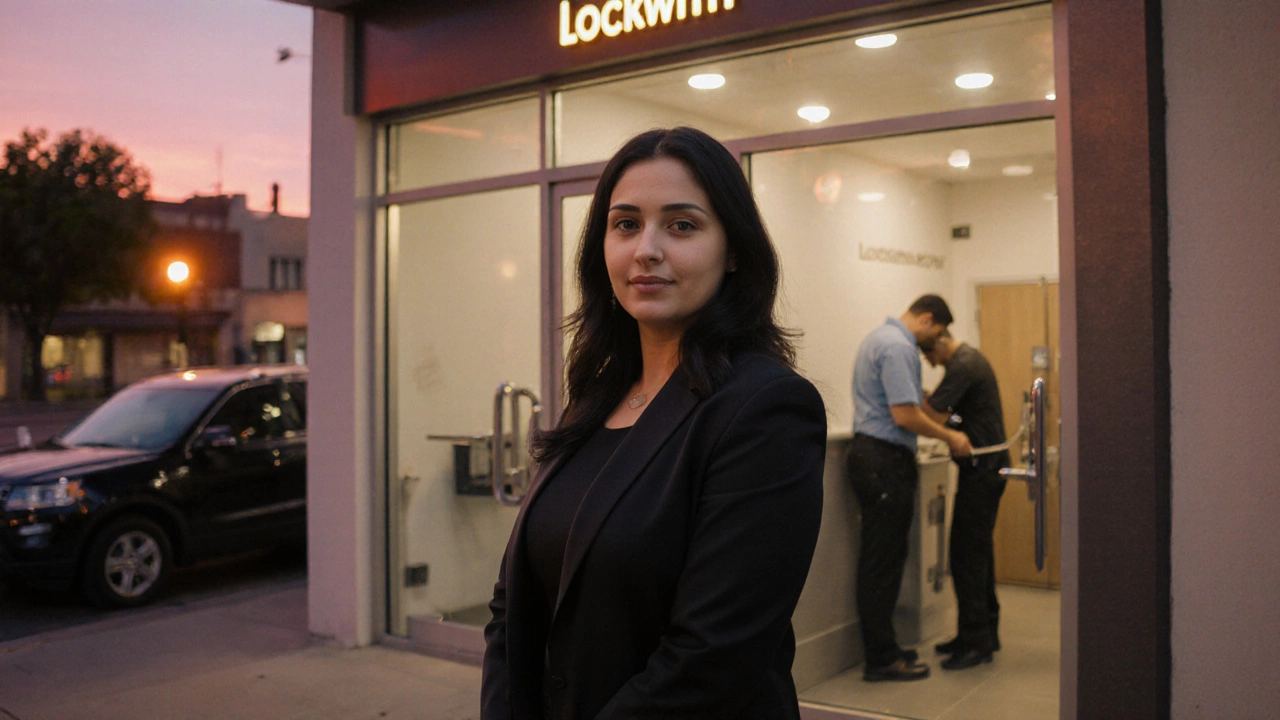Locksmith Salary in California: How Much Do They Earn?

California Locksmith Salary Calculator
Calculate Your Potential Earnings
Enter your details to estimate your annual salary in California based on the latest industry data.
Estimated Annual Salary
Based on 2025 dataYour potential annual earnings:
$XX,XXX
Your estimated hourly rate: $XX.XX
Key Takeaways
- California’s average locksmith salary in 2025 sits around $61,000peryear, well above the national average.
- Entry‑level positions start near $38,000, while seasoned masters can earn $95,000or more.
- Location matters: SanFrancisco and LosAngeles pay the most, rural counties the least.
- Certifications such as CPL or CSM boost hourly rates by 10‑20%.
- Specializing in commercial or automotive work, joining a union, or running your own shop are proven pathways to higher pay.
When you search “how much do locksmiths make in California?” you’re looking for a clear number, but the reality is a range that shifts with experience, specialty, and even the zip code you work in. This guide walks you through the latest wage data, the factors that push the numbers up or down, and practical steps you can take to maximize your earnings as a locksmith in the Golden State.
Locksmith is a skilled tradesperson who installs, repairs, and adjusts locks and security devices for residential, commercial, and automotive applications. In California, locksmiths operate in a market that blends high demand for security with a cost‑of‑living that varies dramatically from desert towns to coastal metros.
Understanding the Base Numbers
The U.S. Bureau of Labor Statistics (Bureau of Labor Statistics federal agency that tracks employment and wage data across occupations) reports a median annual wage for locksmiths nationwide of $46,200 in 2024. California’s median jumps to $61,300, reflecting both higher demand and a steeper cost of living.
Breaking it down by hour, the statewide average sits at $29.45/hour. For comparison, the national average is $22.20/hour. Those figures translate to roughly $61,300 versus $46,200 per year when you assume a full‑time 40‑hour work week.
What Drives Salary Differences?
Several variables shape the paycheck you’ll see on a typical pay stub:
- Experience level: New graduates or apprentices earn the lowest rates, while master locksmiths command premium fees.
- Specialty: Automotive and commercial locksmiths often charge more than residential technicians because of the complexity of the work.
- Location: Cities with high property values and dense business districts pay more for security services.
- Certifications: Credentials such as Certified Professional Locksmith (CPL) or Certified Security Manager (CSM) can boost hourly rates by 10‑20%.
- Employment type: Working for a large security firm, joining a union, or running your own shop each have distinct earnings potentials.
Salary by Experience Level
The following table illustrates typical earnings ranges for three common career stages in California. Numbers are based on BLS data, industry surveys, and wage reports from 2025.
| Experience Level | Annual Salary | Hourly Rate | Typical Work Setting |
|---|---|---|---|
| Entry‑Level (0‑2years) | $38,000-$45,000 | $18-$22 | Apprenticeship, small shops |
| Mid‑Level (3‑7years) | $55,000-$70,000 | $26-$34 | Mid‑size firms, municipal contracts |
| Master/Owner (8+years) | $85,000-$110,000+ | $41-$53+ | Own business, high‑end commercial contracts |
Geographic Hotspots Within California
Even within one state, wages can differ wildly. Below are four representative metro areas, with average hourly rates adjusted for local cost‑of‑living indices.
- SanFrancisco Bay Area: $36/hour - high demand from tech campuses and luxury condos.
- LosAngeles County: $33/hour - many commercial contracts for film studios and retail centers.
- San Diego: $30/hour - strong residential market, growing automotive sector.
- Central Valley (e.g., Fresno, Bakersfield): $24/hour - lower cost of living, but also fewer high‑end contracts.
These numbers line up with the Cost of Living Index a measure that compares local price levels to the national average, meaning a $30/hour wage in Fresno may stretch further than the same rate in SanFrancisco.
Boosting Your Earnings
Want to move from the mid‑range $55,000 bracket into the $90,000‑plus club? Here are four proven strategies:
- Earn industry certifications. The Certified Professional Locksmith (CPL) a credential offered by the Associated Locksmiths of America adds about 12% to hourly rates, while a CSM can increase earnings by up to 18%.
- Specialize. Mastering high‑security lock systems (e.g., Medeco, Mul‑Ti‑Lock) or automotive transponder programming commands premium pricing.
- Join a union. The International Association of Locksmiths a labor group that negotiates wages and benefits for members reports members earn 7‑10% more on average.
- Start your own shop. Owning a business lets you set rates, keep a larger share of job revenue, and diversify into security consulting.
Typical Benefits and Bonuses
Beyond base pay, many California locksmiths receive additional compensation:
- Overtime: California labor law mandates time‑and‑a‑half after 8hours per day, which can add $5‑$10/hour during peak seasons.
- Travel stipends: Technicians covering large service areas often get mileage reimbursement (≈$0.65/mile).
- Performance bonuses: Companies may award $500‑$2,000 bonuses for hitting monthly service targets.
- Health & retirement: Unionized workers often access group health plans and 401(k) matching.

Real‑World Example: From Apprentice to Shop Owner
Take the story of Maya Patel, who began an apprenticeship in Sacramento at age 22. Her first year, she earned $19/hour, totaling about $39,000. After two years of on‑the‑job training and earning her CPL, she moved to a mid‑size commercial firm in Oakland, where her rate rose to $28/hour ($58,240 annually). Five years later, Maya saved enough to open a boutique security shop in SanJose, hiring two junior locksmiths and charging a premium $45/hour for high‑security installations. In 2025, her shop billed $250,000 in revenue, translating to a personal net income of roughly $95,000 after expenses.
Maya’s trajectory illustrates how experience, certification, and entrepreneurship combine to push earnings well beyond the state average.
Frequently Asked Questions
What is the average hourly wage for a locksmith in California?
The 2025 average is about $29.45/hour, which works out to roughly $61,300 per year for a full‑time worker.
Do certifications really affect pay?
Yes. Obtaining a CPL or CSM typically adds 10‑20% to an hourly rate, because clients trust certified professionals with higher‑security jobs.
How much can a self‑employed locksmith earn?
Successful shop owners often earn $85,000‑$110,000+ annually, depending on location, client mix, and whether they offer additional services like alarm installation.
Is overtime common in this field?
Yes. California law requires overtime pay after 8hours a day, so many locksmiths see a boost of $5‑$10/hour during busy periods.
Which California cities pay the most?
SanFrancisco, LosAngeles, and SanDiego lead the pack, with average hourly rates ranging from $30to $36.
Bottom Line
If you’re weighing whether to become a locksmith or to stay in your current trade, the numbers speak loudly: California offers some of the highest wages in the nation, especially for those who invest in certifications, specialize, or launch their own business. Keep an eye on local cost‑of‑living trends, and consider the long‑term upside of moving from entry‑level work to a master‑level operation.
Ready to start your journey? Look for apprenticeship programs in your county, sign up for a CPL course, and begin tracking your hourly earnings against the benchmarks above. The data shows a clear path: skill up, specialize, and watch that locksmith salary in California climb.

Post-Comment